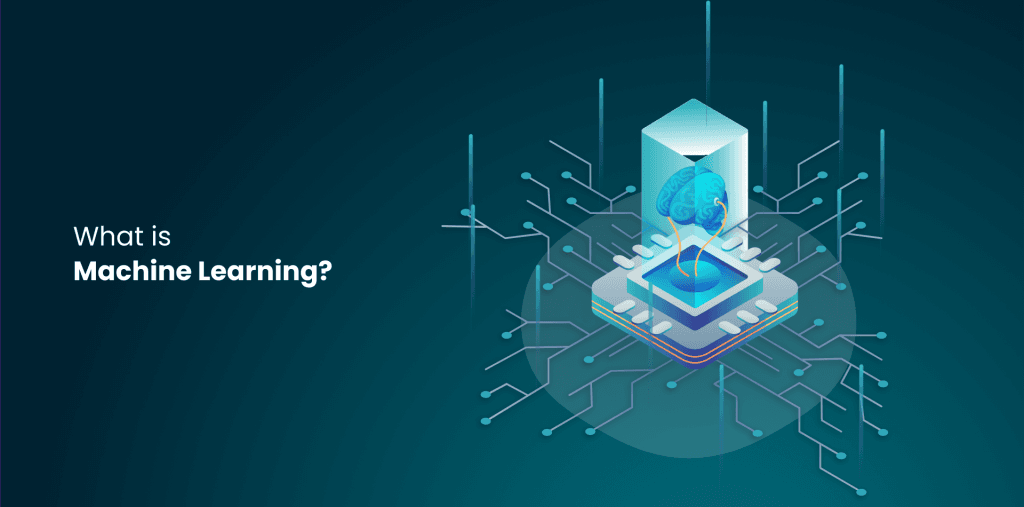Last Updated on –
July 15, 2025
Business
What is Machine Learning? Real-World Examples & Why It Matters in 2025
Rohit Gajjam
Introduction: Why Everyone's Talking About Machine Learning
In today’s digital age, Machine Learning has become more than just a trend; it’s a driving force behind innovation in every industry. From personalized Netflix recommendations to fraud detection in banking, Machine Learning is silently powering everyday technology. But what exactly is Machine Learning, and why is it crucial in 2025?
In this blog, we’ll explore:
- What Machine Learning really means
- How it works in real-world scenarios
- Its impact on various sectors
- Future trends and why your business should care
Let’s decode Machine Learning without the jargon.

What Is Machine Learning?
Machine Learning (ML), a branch of Artificial Intelligence (AI), allows systems to automatically learn from experience and enhance their performance without the need for explicit programming.
Rather than being explicitly programmed with rules, a Machine Learning model learns from data patterns to drive its predictions or choices. The more data it processes, the more accurate its predictions become.
Common Types of Machine Learning:
- Supervised Learning –Involves training models on datasets that include both input and known output labels (e.g., detecting spam emails).
- Unsupervised Learning – Involves analyzing data without predefined labels to discover patterns or groupings (e.g., segmenting customers).
- Reinforcement Learning – Involves learning by receiving rewards or penalties from actions taken in an environment (e.g., navigating a self-driving car).
Real-World Machine Learning Examples (2025)
1. Healthcare: Predictive Diagnosis and Personalized Treatment
Machine Learning algorithms are transforming healthcare by examining patient data, lab results, and genetic information to detect conditions such as cancer or diabetes at early stages before they fully manifest.
Case Study: Google Health’s AI model has recently demonstrated a 94% accuracy rate in identifying breast cancer from mammogram images, surpassing the performance of human radiologists
2. Finance: Fraud Detection and Risk Assessment
By using Machine Learning, banks can continuously scan vast numbers of transactions and catch suspicious activity before customers notice anything unusual.
Example: JPMorgan Chase leverages machine learning models to detect unusual credit card transactions and evaluate loan eligibility by analyzing a user’s complete financial history, rather than relying solely on their credit score.
3. E-Commerce: Recommendation Engines
Ever wondered how Amazon always seems to know what you want to buy next? That’s Machine Learning at work.
Stat: According to McKinsey, 35% of Amazon’s revenue comes from its Machine Learning-powered recommendation system.
Why Machine Learning Matters for Businesses in 2025
Whether you’re a small business or a tech giant, Machine Learning provides a competitive edge by helping you:
- Automate decision-making processes
- Predict customer behavior
- Optimize pricing models
- Personalize user experiences
- Reduce operational costs
Businesses adopting ML early have seen a 25–40% increase in efficiency, according to a 2024 Gartner report.
Challenges and Considerations
While Machine Learning is powerful, it’s not plug-and-play. Successful implementation requires:
- Clean, quality data
- Skilled data scientists or ML engineers
- Proper infrastructure and computing power
- Ethical and privacy considerations
Future of Machine Learning: What's Next?
In 2025, Machine Learning is anticipated to grow in the following directions:
- Explainable AI (XAI): Helping humans understand why a model made a certain decision.
- Edge ML: Bringing ML processing to local devices like smartphones, improving speed and reducing dependence on the cloud.
- AutoML: Tools that automate model selection and tuning, making ML accessible to non-experts.
Conclusion
Machine Learning is fundamentally transforming how businesses operate, compete, and grow. By uncovering patterns in vast amounts of data, it enables organizations to make faster and smarter decisions. From automating workflows to enhancing customer experiences and predicting trends, Machine Learning sits at the core of modern innovation. As data takes center stage in modern industries, Machine Learning has evolved from a competitive edge to a fundamental requirement.
Companies that adopt Machine Learning early are better positioned to adapt, scale, and lead in their markets. As technology becomes more accessible and its applications more widespread, now is the perfect opportunity to embrace this change. Machine Learning isn’t just a technological advancement—it’s a strategic advantage for building a smarter, more efficient, and resilient future.
FAQ’S
Is Machine Learning the same as AI?
No. Machine Learning is a field within Artificial Intelligence that empowers systems to learn and adapt based on data.
Can small businesses use Machine Learning?
Absolutely. With the rise of AutoML tools and cloud platforms like Google Cloud and AWS, even startups can integrate Machine Learning into their workflows.
What industries benefit the most from Machine Learning?
Healthcare, finance, retail, manufacturing, and marketing are among the top beneficiaries.
